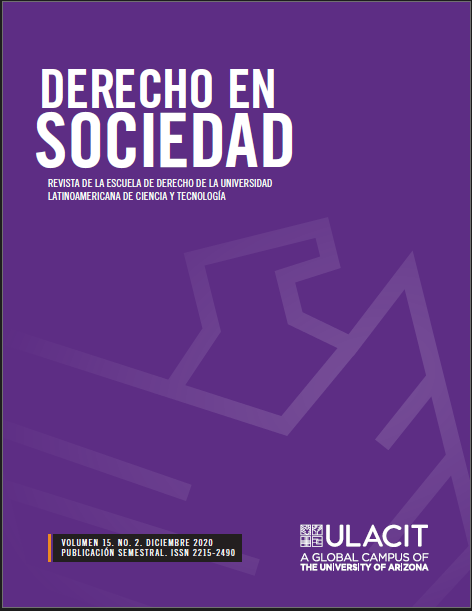E-commerce as a strategy for business continuity during a global pandemic and its legal implications in the Costa Rican system

Published 2023-12-21
Keywords
- e-commerce, strategy, pandemic, law, business.
How to Cite
Copyright (c) 2023 Derecho en Sociedad

This work is licensed under a Creative Commons Attribution-NonCommercial-ShareAlike 4.0 International License.
Downloads
Abstract
The implementation of e-commerce is a strategy that generates benefits for companies and consumers; among them, the continuity of businesses. This is essential due to the new global reality that results from the spread of COVID-19. Fortunately, existent technologies have made it easier, where online commercial transactions are possible. This research paper provides an overview of the relevant aspects of e-commerce, its legal regulation in Costa Rica, and the way merchants and consumers have used it during the pandemic. In the same way, it exposes experts’ understanding of the situation and shows the main challenges and progress of the Costa Rican regulatory framework. The results suggest that e-commerce will continue growing in the future; however, the country’s evolvement is relatively little. The need for a broad and clear special legislation to regulate it is evident, as well as the
generation of knowledge in the population about the rights and obligations that belong to consumers and businesses.
References
- Amat, F. (2011). Usando la web 2.0 para informarse e informar. Una experiencia en educación superior. https://revistas.usal.es/index.php/eks/article/view/7827
- Asamblea Nacional Constituyente de la República de Costa Rica. (1949). Constitución Política de Costa Rica. https://www.pgrweb.go.cr/scij/Busqueda/Normativa/Normas/nrm_texto_completo.aspx?nValor1=1&nValor2=871
- Asamblea Legislativa de la República de Costa Rica. (1888). Código Civil. Ley N.° 63. http://www.asamblea.go.cr/sd/SiteAssets/Lists/Consultas%20Biblioteca/EditForm/C%C3%B-3digo%20Civil%201888.pdf
- Asamblea Legislativa de la República de Costa Rica. (1995). Ley de Promoción de la Competencia y Defensa Efectiva del Consumidor. N.° 7472. http://reventazon.meic.go.cr/informacion/legislacion/consumidor/7472.pdf
- Asamblea Legislativa de la República de Costa Rica. (2011). Ley de Protección de la Persona frente al Tratamiento de sus Datos Personales. Ley N. ° 8968. http://www.pgrweb.go.cr/scij/Busqueda/Normativa/Normas/nrm_texto_completo.aspx?param1=NRTC&nValor1=1&n-Valor2=70975&nValor3=85989&strTipM=TC
- Asamblea Legislativa de la República de Costa Rica. (2017). Reforma Reglamento a la Ley de Promoción de la Competencia y Defensa Efectiva del Consumidor N.º 7472 N.° 40703-MEIC. http://www.pgrweb.go.cr/scij/Busqueda/Normativa/Normas/nrm_texto_completo.aspx?param1=NRTC&nValor1=1&nValor2=85162&nValor3=110031&strTipM=TC
- Baudrit, D. (2016). Teoría general del contrato. Editorial Juricentro.
- Calatayud, V. (2018). Curso de obligaciones. ULACIT.
- Cámara de Comercio de Costa Rica. (2012). Costa Rica: Número De Empresas (Pymes). http://camara-comercio.com/camara2/wpcontent/uploads/2015/11/17_docestadisticasempresas.pdf
- CCInsight. (2020). About COVID-19 Commerce Insight. https://ccinsight.org/about/
- Comisión de las Naciones Unidas para el Derecho Mercantil Internacional, CNUDMI. (1996). Ley Modelo de la CNUDMI sobre Comercio Electrónico con la Guía para su Incorporación al Derecho Interno. https://www.uncitral.org/pdf/spanish/texts/electcom/05-89453_S_Ebook.pdf
- Comisión Nacional del Consumidor. (2016). Voto 525-16. https://www.consumo.go.cr/comision_nacional_consumidor/jurisprudencia/voto_525-16.pdf
- Cordero, C. (2018, 5 de julio). Pymes, comercios y consumidores dieron el salto al e-commerce. El Financiero. https://www.elfinancierocr.com/tecnologia/pymes-comercios-y-consumidores-dieron-elsaltoal/HOLEN63LOJDSBETTUBOFRI6CGE/story/
- Cordero, E. (2009). Los principios y reglas que estructuran el ordenamiento jurídico chileno. Revist ius et praxis, 15(2), 11-49. https://scielo.conicyt.cl/scielo.php?pid=S0718-00122009000200002&script=sci_arttext
- Corte Suprema de Justicia. (2013). Sala Primera. Resolución 01582-2013. https://nexuspj.poder-judicial.go.cr/document/sen-1-0034-622173
- Deloitte. (2019). Comercio electrónico. https://www2.deloitte.com/content/dam/Deloitte/ec/Documents/consumer-business/Comercio-Electronico.pdf
- Fernández, A., Escobedo, M. C., Jiménez H. V. y Hernández, R. (2015). La importancia de la innovación en el comercio electrónico. Revista Universia Business Review, 1(47), 106-125.https://www.redalyc.org/pdf/433/43341001006.pdf
- Griffin, R. W. y Ebert, R. J. (2005). Negocios. Pearson Educación.
- Hernández Sampieri, R., Fernández Collado, C. y Baptista Lucio, P. (2014). Metodología de la investigación. McGrawHill.
- Kotler, P. y Armstrong, G. (2012). Marketing. Pearson Educación.
- Monge, I. (2014). Curso de derecho comercial. Investigaciones Jurídicas.
- Organización Mundial del Comercio, OMC. (2020). Los principios del sistema de comercio. https://www.wto.org/spanish/thewto_s/whatis_s/tif_s/fact2_s.htm
- Organización Mundial de la Propiedad Intelectual. (2020). Tratados administrados por la OMPI.https://www.wipo.int/treaties/es/
- WARC Data Points. (2020). E-commerce shopping more frequent because of COVID-19. Recuperado de https://www.warc.com/content/paywall/article/WARC-DATAPOINTS/Ecommerce_shopping_more_frequent_because_of_COVID19/132077
